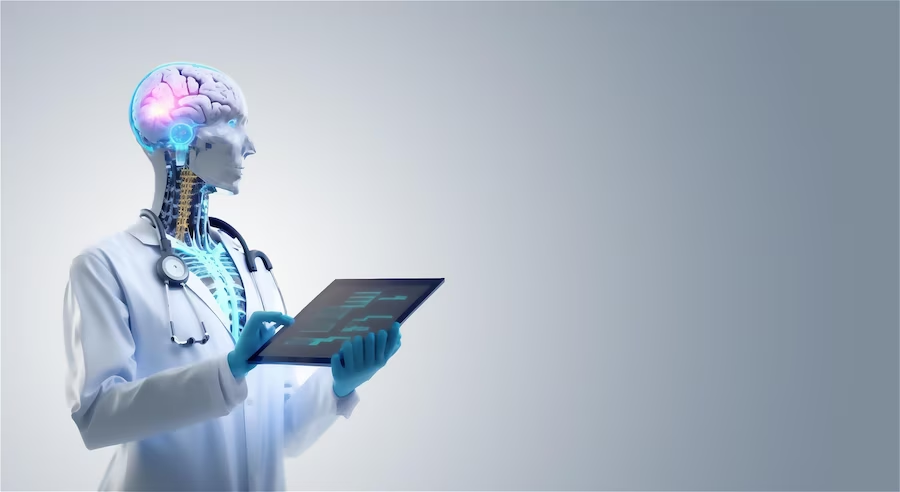
Dec 07, 2023
The healthcare industry is well-known for its demanding nature, requiring doctors, nurses, and other medical professionals to handle numerous responsibilities while maintaining a work-life balance. However, the integration of artificial intelligence (AI) has ushered in a new era of efficiency and productivity, allowing these professionals to accomplish more in less time. AI is now playing a crucial role in various tasks that were once performed manually by medical personnel. By automating processes and leveraging data analysis capabilities, AI has the potential to transform healthcare delivery and enhance patient outcomes.
This section explores the ways in which AI is revolutionizing the healthcare industry and assisting doctors and nurses in their daily tasks.
AI ensures efficient note taking
Medical note-taking is a time-consuming task that doctors and nurses must tackle on a daily basis. However, AI-powered machines can now generate notes automatically, saving valuable time for healthcare professionals. By utilizing AI, doctors can focus on more critical responsibilities, while AI algorithms transcribe audio files and produce written text at a much faster pace than humans. AI-enabled note-taking technology has been in use for some time, empowering doctors to increase their efficiency during patient visits and consultations. It alleviates their workload and frees up time for managing appointments, billing, and other essential tasks.
Accuracy in medical note taking
Accurate medical notes are vital for healthcare professionals as they contain critical information about a patient's medical history, diagnosis, and treatment. However, not all medical professionals possess strong note-taking skills, potentially leading to discrepancies or misinterpretations. Nurses, in particular, face challenges when attempting to capture real-time events in the ward. By implementing AI assistants, doctors can focus on providing patient-centered care, while the AI system documents the relevant information in the electronic health records.
Enhancing Patient Satisfaction through AI
AI technology significantly reduces the time doctors spend on note-taking, improving patient satisfaction. By automating tasks such as note-taking, data entry, and transcription, AI enables doctors to devote more time to patient interactions. Increased face-to-face time between doctors and patients fosters better communication and engagement, ultimately leading to higher patient satisfaction levels.
Uncovering Patterns and Trends in the Medical Field with AI
The medical industry is full of patterns and trends that can be tracked and analyzed. AI offers invaluable assistance to doctors and nurses by organizing patient health records in a structured manner. Through charts, graphs, and tables, AI-powered systems present data in an easily comprehensible format, allowing doctors to identify significant patterns in patients' health records. This capability empowers healthcare professionals to make informed decisions and develop personalized treatment plans based on data-driven insights.
AI as a Feedback Mechanism for Doctor's Notes
Medical professionals often need to provide feedback on their own notes regarding a patient's condition. However, time constraints may lead to important details being overlooked. AI can lend a helping hand by reviewing doctors' notes and providing feedback on any errors or omissions, such as typos or misinterpreted words. Over the years, AI has evolved from providing transcription services to becoming a valuable assistant in the note-writing process, enhancing accuracy and efficiency.
The upshot
The use of an AI scribe in healthcare can ease the crushing burden of documentation that takes physicians hours a day and contributes to burnout. This automated solution is a promising weapon to combat physician workload crisis. Despite the fact that AI promises to revolutionize medical note-taking, concerns mount about accuracy. Hence, by using a hybrid approach you get to enjoy the best of both worlds – the efficiency of an AI scribe as well as the accuracy, with quality audits by human scribes.

Please fill out this form.
We will reach out to you within 24 hours

Thomas Kennedy

Thomas Kennedy

Documentation is an important daily clinical responsibility. In order to optimize patient care, physicians are always on the lookout for new ways to effectively and efficiently document patient visits.
The use of virtual medical scribes has become increasingly popular in the recent years, as medical practices across the country are on the constant lookout for ways to reduce clinical documentation overload, thereby improving overall productivity.
The clerical burden associated with EHR usage is attributed as the number one cause of physician burnout. We also know that physicians spend twice as much time on EHRs and other clerical tasks compared to the time providing patient care.